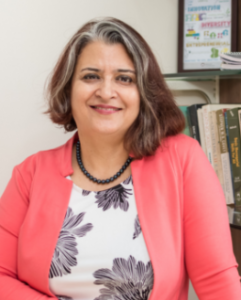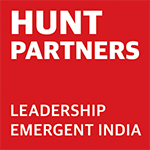Anu WakhluMD, Pragati Leadership & Independent Director on the Board of SKF India Ltd.
Anu Wakhlu is the Co-founder and the Chairperson of India’s Leading Organisational Transformation, Leadership development, and HR Consulting Firm Pragati Leadership Institute Pvt. Ltd and the CEO of CoachMantra. She is also the Executive Director of Pragati Foundation – a CSR initiative of Pragati Leadership. Anu is on the Boards of SKF, Pragati Leadership and Pragati Foundation.
She has worked very closely with the top management of leading organisations in the country to help create and realign their businesses with their Vision, Mission and Values. Anu coaches CXO’s, facilitates senior level workshops on Leadership, Collaboration, Visioning and Culture Building. Anu is a thought leader, an ICC certified PCC coach and an active contributor in the areas of HRD and Organizational Transformation with over 30 years of experience in these fields.
She has a multi-faceted personality. She is the author of the book, ‘Time and Life Management’ and is best known for ‘making things happen’ through her patience and perseverance. Anu is an Ashoka Fellow which is an elite community of social entrepreneurs and is working on projects related to Women’s Health, Capacity Building of NGO’s and Creating partnerships between Corporates and NGOs.
She is closely associated with Soroptomist International, an organization dedicated to growth and empowerment of Women worldwide and is the President of this organization from India.
Anu has received several Awards and Recognitions for her exceptional work in the area of Women empowerment. She was recently conferred on prestigious ‘Exceptional Woman of Excellence Award’ by World Economic Forum (WEF) and ALL Ladies League on 8th March 2018 at The Hague, Netherlands. She was also awarded Grassroots Woman of the Decade Award from ALL Ladies league of ASSOCHAM and Rotary GSE award for representing India in Austria and Germany. Anu loves sketching and painting and when not training, she loves being close to nature, gardening, reading and spending time with her pet dog Zorba.

1. What was the mandate given to you by the Board when you took over in your role?
The mandate given by the Board was to create a sustainable organization that can withstand the turmoil in the external landscape and build long term engagements with clients. It was clear that our business was not to just grow the top-line but to ensure that the foundations that contribute to a sustainable business are cultivated and nurtured.
2. How much of that has been achieved? What were the challenges faced?
I think we have achieved it partially. I am very hard on myself and our company’s achievements since I always feel we can do more! The main challenge for us has been the VUCA environment and the lack of sentiments in the market which impact the businesses of our clients and therefore ours. We are a service organization-our fortunes are dependent on how our clients fare with their businesses. We have been able to sustain and also build deep client engagements with our key customers. It’s a matter of pride that we have clients with over 10-15 years of a history of engagements. We however have to do much more to understand the challenges of our clients and come out with solutions that can help them to be competitive. Since our focus is on building the human capital, sometimes our services don’t serve all the needs that our clients need to be competitive in today’s business environment.
3. What are the key challenges your organization is facing currently? And what are the steps you are taking?
Our main challenge today is that a large part of our clients are from the Manufacturing sector and BFSI. So if there is any negative market sentiment which impacts our clients, we are vulnerable. So the obvious answer is to be open to new sectors and new industries. That’s what we are getting into now.
4. How have the changes in technology/globalization/economy affected your sector?
Digitization of learning has impacted our business to some extent. Companies and managers want to avail of mobile-app based learning -partly because it’s convenient and also because it’s savvy! The economic downturn has also led to many HR /L &D managers taking a break from work and working as free-lance learning professionals. That is another change.
5. What is your talent strategy? How do you draw the balance between home grown vs lateral hiring at the leadership level?
Our talent strategy for our Coaches, Facilitators and Consultants is to hire the very best. We have been very lucky in not having to go to recruit these since we always have a large number of excellent talent wanting to join us. We follow a strategy of 80: 20 in our hiring. We do grow talent from within but there is always a need to hire from outside to bring in a pool of new talent and more engagement.
6. How does your organization identify and develop future leaders?
This is really an ongoing process. Mainly we watch how people perform in their roles with special attention to their client interface skills and their willingness to stretch for the organization. These people are then mentored and coached for higher level roles.
7. In a world full of volatility, Uncertainty, complexity & Ambiguity (VUCA), innovation has become one of the most important factors to transform a crisis into an opportunity. How do you promote Innovation?
Innovation is not merely a way to be competitive but it’s also a great engagement tool. One of the ways we try to stay innovative is by helping our clients to do so! That sort of forces us to stay innovative. Each year we come out with at least 3 new products/services. Different teams work on this. We also share a lot of best practices/failures to stay open to learning and innovation. We have found that while people are preparing for a new future/newness, there is a lot of engagement of the entire team and that is why we feel innovation is a strategy for employee engagement too.
8. How do you define & practice leadership?
Leadership for me is the ability to create a new future. It’s the ability to think in new ways, imagine what is not explicit and create a road-map for it by involving and inspiring people. I try to practice as best as I can. I feel I can inspire more!
9. How can Indian leaders become Global Leaders?
Indians are already Global Leaders. If we look at some of the best companies in the world, they have been/are led by Indians. I think some of the best CEO’s I have met have been Indians. They balance perspectives very well. What Indian Leaders can do better I think is to inspire more .Bring out their thoughts, paradigms into the open, share more on expectations. In other words- inspiring communication. In general (which is not for Leaders alone), I think we in India need to work on our personal character building! Be more in integrity with what we know is right.
10. What are the 3 most pivotal moments in your career that you either learned from and/or that got you where you are today?
I think the first major moment was (as I am sure is for most people), the first job I took. My education did not really prepare me for the role I finally got into. I was 23 and thrown into a role that required me to influence and work closely with very senior people. I learnt a lot about building self-confidence through that. The other major learning for me was when I was selected to be the Managing Director and therefore Sales Head for our organization. As a typical Consultant, Facilitator I was very comfortable executing the work for clients but I was hesitant to source business. I had to do that. That enabled me to get over my reluctance of pitching our work to clients. I reset my thinking to the fact that I am not selling but I am offering humongous value to our clients. That helped a lot. The third learning was when I was chosen to represent India as the National Head for a non-profit Women’s organization. The major learning for me was how to work across cultures and collaborate well with others.
11. What message would you like to share with young professionals at the start of their career?
I think one should work a lot on one’s networks and maintain good relationships with all stakeholders. Often we want to win a battle but end up losing a war. Good interpersonal skills enable you to really build networks and the ability to influence people. Also always have an active interest that you can nurture and cultivate along with your professional career development. It helps to retain sanity! Find time to find our purpose and intent for your life-that’s the lodestar for your career.
